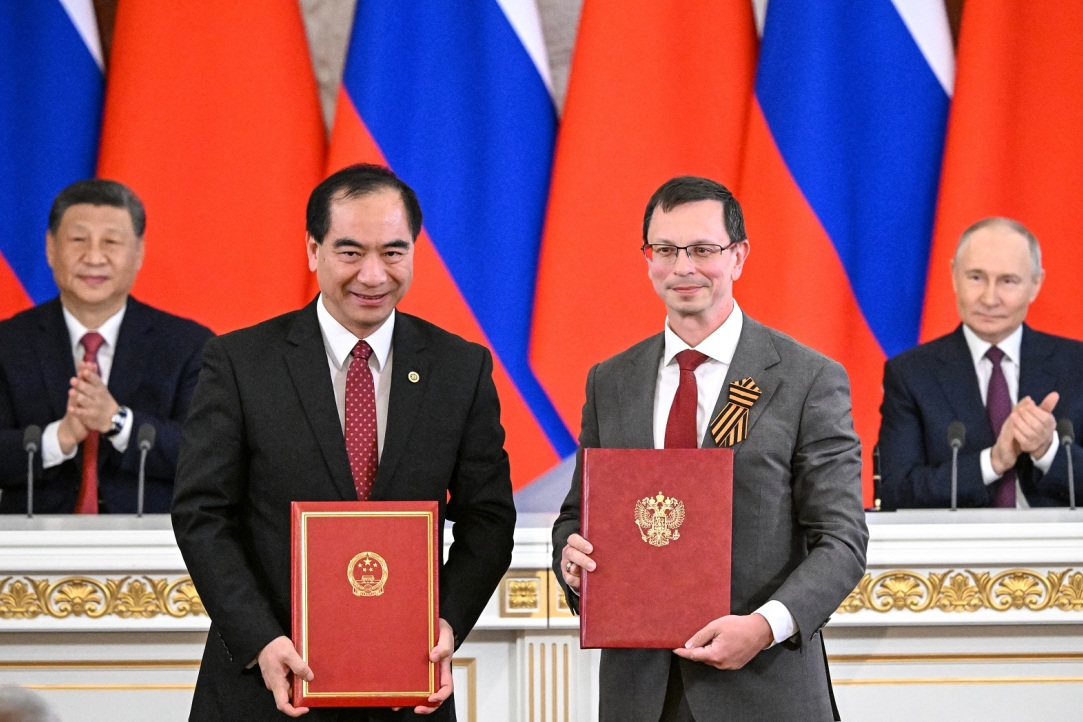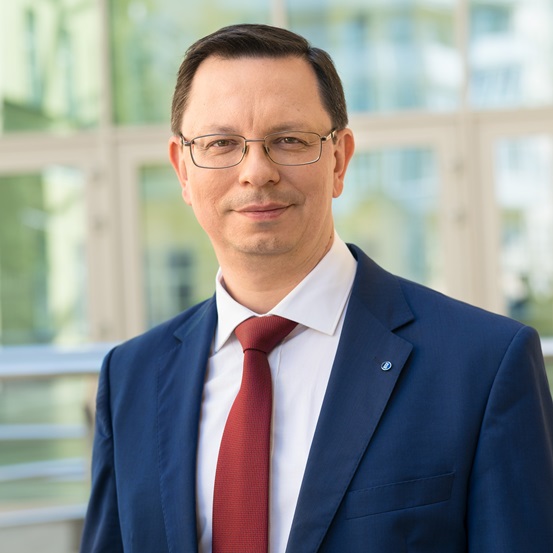HSE University Signs Cooperation Agreements with Leading Chinese Universities

On May 8, 2025, in Moscow, in the presence of Russian President Vladimir Putin and Chinese President Xi Jinping, strategic agreements were signed between HSE University and two of China's top institutions, Peking University and Tsinghua University. The event was attended by Nikita Anisimov, Rector of HSE University, Qiu Yong, Secretary of the CPC Tsinghua University Committee, and Gong Qihuang, President of Peking University. The signing unfolded during the official visit of the Chinese delegation to Russia, coinciding with the commemoration of the 80th anniversary of Victory Day.
These agreements mark a significant stride in advancing the strategic partnership between Russia and China, aimed at cultivating a unified academic space and reinforcing the BRICS institutional framework. By emphasising fundamental disciplines, both nations express a commitment to advancing research that paves the way for future technological breakthroughs.
The agreement between HSE University and Peking University focuses on enhancing scientific collaboration in natural sciences, including physics, chemistry, and advanced materials. The universities have embarked on a joint research initiative titled 'Engineering of Highly Efficient and Stable Perovskite Solar Cells.' This project became one of the winners of the HSE University competition 'International Academic Cooperation.' In this initiative, HSE University is represented by the Quantum Nanoelectronics Laboratory of the HSE Tikhonov Moscow Institute of Electronics and Mathematics.
Additionally, HSE University and Peking University will sign an agreement to establish a BRICS research platform. This collaborative academic space will enable Russian and Chinese researchers to delve into crucial areas of scientific enquiry, examine the operations of multilateral institutions, explore global governance processes, and analyse interactions between Russia and China in the field of international relations.
The cooperation agreement between HSE University and Tsinghua University is aimed at cultivating academic, cultural, and educational ties. This partnership will lay the groundwork for collaborative programmes, including research endeavours and student exchanges.
Today, HSE University stands as one of Russia's top universities focused on fostering a comprehensive partnership between Russia and China. The institution collaborates with over 40 leading educational and research organisations in China. HSE University offers a diverse range of bachelor's, master's, and professional retraining programmes centred on Chinese studies and engagement with China. Approximately 1,300 HSE students are currently learning Chinese, while more than 300 students from China are enrolled at HSE University, many through exchange programmes.
Looking ahead, HSE University aims to broaden its cooperation formats and introduce new initiatives with Chinese universities and research centres, emphasising the advancement of fundamental sciences and the enhancement of international scientific dialogue.

Nikita Anisimov, Rector of HSE University
'HSE University and Chinese universities are already connected through successful joint efforts. Recently, during our delegation's visit to China, our universities reached an agreement to further expand this partnership. We are confident that our new agreements with Peking University and Tsinghua University will not only strengthen bilateral ties and enrich cutting-edge scientific research but also propel the cooperation between Russia and China to new heights. Notably, our scientific collaboration with Chinese partners now includes a BRICS dimension: the member states play a crucial role in shaping a new multipolar global architecture, which necessitates comprehensive and profound expert examination of their interactions and influence on the international landscape.'
See also:
‘Keep Working, Keep Publishing—Consistency Matters’
Ziyuan Zhu, from Beijing, China, is an international PhD student at the Institute for Public Administration and Governance at HSE University in Moscow. In this interview with the HSE News Service, Ziyuan talks about how studies can influence one’s outlook on life, comparing public service models in different countries, and why being a Chinese student in Russia is advantageous in research.
HSE Psycholinguists Launch Digital Tool to Spot Dyslexia in Children
Specialists from HSE University's Centre for Language and Brain have introduced LexiMetr, a new digital tool for diagnosing dyslexia in primary school students. This is the first standardised application in Russia that enables fast and reliable assessment of children’s reading skills to identify dyslexia or the risk of developing it. The application is available on the RuStore platform and runs on Android tablets.
HSE Scientists Optimise Training of Generative Flow Networks
Researchers at the HSE Faculty of Computer Science have optimised the training method for generative flow neural networks to handle unstructured tasks, which could make the search for new drugs more efficient. The results of their work were presented at ICLR 2025, one of the world’s leading conferences on machine learning. The paper is available at Arxiv.org.
Under a Blooming Magnolia: How Russian and Chinese Scientists Create Solar Cells of the Future
Schola continues to introduce the winners of the International Academic Cooperation competition. In today's issue, Professor Andrey Vasenko, Deputy Head of the Scientific and Educational Laboratory of Quantum Nanoelectronics at Tikhonov Moscow Institute of Electronics and Mathematics (MIEM), speaks about the joint project between his laboratory and the Peking University research team— ‘Engineering of highly efficient and stable perovskite solar cells.’
Physicists Propose New Mechanism to Enhance Superconductivity with 'Quantum Glue'
A team of researchers, including scientists from HSE MIEM, has demonstrated that defects in a material can enhance, rather than hinder, superconductivity. This occurs through interaction between defective and cleaner regions, which creates a 'quantum glue'—a uniform component that binds distinct superconducting regions into a single network. Calculations confirm that this mechanism could aid in developing superconductors that operate at higher temperatures. The study has been published in Communications Physics.
Neural Network Trained to Predict Crises in Russian Stock Market
Economists from HSE University have developed a neural network model that can predict the onset of a short-term stock market crisis with over 83% accuracy, one day in advance. The model performs well even on complex, imbalanced data and incorporates not only economic indicators but also investor sentiment. The paper by Tamara Teplova, Maksim Fayzulin, and Aleksei Kurkin from the Centre for Financial Research and Data Analytics at the HSE Faculty of Economic Sciences has been published in Socio-Economic Planning Sciences.
Graduate School of Business MBA Students Take Part in Offsite Module in China
MBA students of the HSE Graduate School of Business HSHSE have recently completed the international component of their studies at the School of Economics and Management at Tsinghua University. The module focused on developing business through innovation. The participants discussed the impact of new technologies on corporate structures and visited companies operating in robotics and renewable energy.
Larger Groups of Students Use AI More Effectively in Learning
Researchers at the Institute of Education and the Faculty of Economic Sciences at HSE University have studied what factors determine the success of student group projects when they are completed with the help of artificial intelligence (AI). Their findings suggest that, in addition to the knowledge level of the team members, the size of the group also plays a significant role—the larger it is, the more efficient the process becomes. The study was published in Innovations in Education and Teaching International.
New Models for Studying Diseases: From Petri Dishes to Organs-on-a-Chip
Biologists from HSE University, in collaboration with researchers from the Kulakov National Medical Research Centre for Obstetrics, Gynecology, and Perinatology, have used advanced microfluidic technologies to study preeclampsia—one of the most dangerous pregnancy complications, posing serious risks to the life and health of both mother and child. In a paper published in BioChip Journal, the researchers review modern cellular models—including advanced placenta-on-a-chip technologies—that offer deeper insights into the mechanisms of the disorder and support the development of effective treatments.
Advancing Personalised Therapy for More Effective Cancer Treatment
Researchers from the International Laboratory of Microphysiological Systems at HSE University's Faculty of Biology and Biotechnology are developing methods to reduce tumour cell resistance to drugs and to create more effective, personalised cancer treatments. In this interview with the HSE News Service, Diana Maltseva, Head of the Laboratory, talks about their work.


